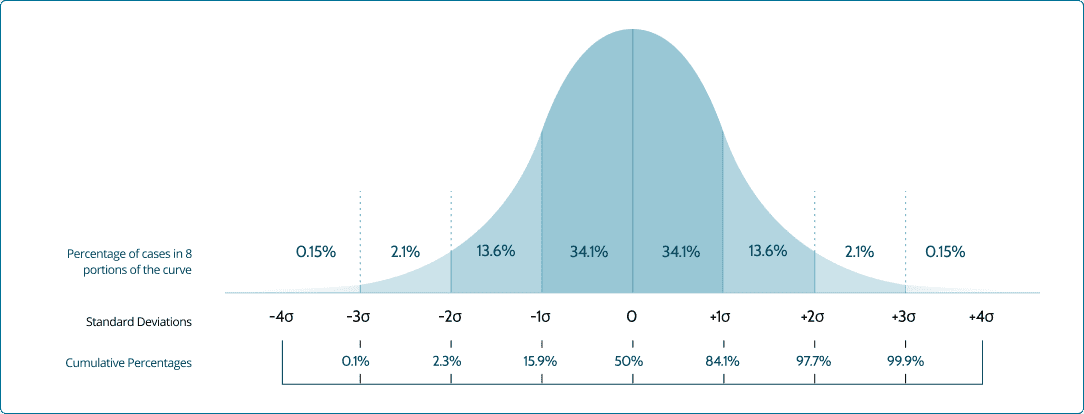BestCollege’s ROI Methodology
Is the school you’re interested in a good investment for your future? We’ve compared hundreds of schools to highlight educational opportunities that give you a strong return on your investment.
How We Collect Data and Compare Schools
At BestColleges, we recognize schools with outstanding performance in areas that directly impact students. We want to give you all the information you need to choose the right school. By displaying awards like Best Value, we hope to give you the tools to effectively compare schools and decide where you want to apply.
We use a normal bell curve to determine if we should issue an award. These awards are based on if the school is significantly higher or lower than other schools in certain areas. If the metric we’re measuring falls outside one standard deviation of the mean (or approximately higher or lower than 84% of all other similar schools), that school is given an award.

We use publicly available provisional datasets from Integrated Postsecondary Education Data System (IPEDS) [2020-2021] and College Scorecard to collect data and inform our school awards. In the absence of IPEDS and CollegeScorecard data, we group schools based on similar characteristics and estimate their value based on what they offer to students like you — both financially through federal grants and academically using our rankings methodology.
Data is complex, and we acknowledge we may not always get it right. If you spot missing or outdated information on our site, please contact us at contact@support.bestcolleges.com so we can address it.
Creating Our ROI Value Score
We want to make sure you’re getting the most out of the school you choose. That means not only comparing programs and what each school has to offer, but also looking at cost and how fast you may be able to pay off tuition after graduation. Your estimated return on investment, or the speed at which you can pay off your school debt, is a huge consideration.
All of the schools we reviewed are within the United States, have programs that last four years or more, are regionally accredited, and are either public or private not-for-profit institutions. We compared how much you could earn with a degree versus only having a high school diploma. In 2020, the median yearly earnings of college grads with a bachelor’s degree were 63% higher than those with a high school diploma.
Weighing Potential Income Against School Costs
Next, we compared that earning potential against school costs and financial aid opportunities. The lower the final cost, the higher our score. Our goal is to help you find schools that won’t break the bank for years to come.
In the example above, the estimated annual salary is well above the cost of attending this school each year. The $13,800 annual price tag can likely be paid off in manageable increments over the next few years, making this school a good investment.
How Our ROI Ratings Work
Low
Based on our research, these schools may take a while to pay off. Depending on your degree and potential salary, these schools may have a lower return on your investment.
Medium
These schools may take time to pay off, but they aren’t the most expensive option either. Depending on your job field and salary, you can expect a decent return on your investment.
High
Our research shows that these schools may give you the most out of your money. They’re eligible for a number of federal grants, and your potential salary may help cover your costs.
Explore More College Resources

How to Choose Your College Class Schedule
Learn how to create the best class schedule each semester by considering important academic and nonacademic factors.

by Steve Bailey
Updated March 22, 2023

Full-Time vs. Part-Time Student: What’s the Difference?
Discover the challenges and opportunities full-time vs. part-time students face and get tips on which college experience is right for you.

by Marisa Upson
Updated October 12, 2023

Summer Semester: When Does It Start? And Should You Enroll?
School’s out — or, rather, in — for summer. Discover the pros and cons of enrolling in an optional summer semester in college.

by Anne Dennon
Updated March 20, 2023